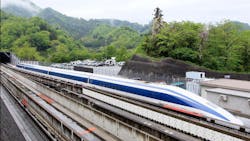Faster Than a Speeding Bullet: Japanese Maglev Train Sets World Speed Record
Japan's state-of-the-art maglev train clocked a new world speed record Tuesday during a test run near Mount Fuji, smashing through the 373 mph mark, as Tokyo races to sell the technology abroad.
The seven-car maglev train -- short for "magnetic levitation" -- hit a top speed of 374 mph, and managed nearly 11 seconds at more than 375 mph, operator Central Japan Railway said.
The new record came less than a week after the company recorded a top speed of 367 mph, surpassing its own 2003 record of 361 mph.
The maglev hovers about four inches above the tracks and is propelled by electrically charged magnets.
About 200 train buffs gathered for Tuesday's record-setting run. "It gave me chills. I really want to ride on the train," an elderly woman told public broadcaster NHK as the carriage rocketed past her. "It's like I witnessed a new page in history."
An AFP reporter who previously rode on the super-speed train said the experience was like taking off in a plane, with the feeling of g-force gathering as the speedometer is pushed ever higher.
"The faster the train runs, the more stable it becomes," Yasukazu Endo, who heads the maglev test center southwest of Tokyo, told reporters. "I think the quality of the train ride has improved."
JR Central wants to have a train in service in 2027, plying the 177-mile route between Tokyo and the central city of Nagoya.
The service, which would run at a top speed of about 310 mph, is expected to connect the two cities in only 40 minutes, less than half the present journey time in Japan's already speedy bullet trains.
Travel Times Cut in Half, U.S. Expansion Possible
By 2045, maglev trains are expected to link Tokyo and Osaka in just one hour and seven minutes, slashing the journey time in half.
However, construction costs for the dedicated lines are astronomical -- estimated at nearly $100 billion just for the stretch to Nagoya, with more than 80% of the route expected to go through costly tunnels.
Japan is looking to sell its shinkansen bullet and maglev train systems overseas, with Prime Minister Shinzo Abe acting as a traveling salesman in his bid to revive the economy partly through infrastructure exports.
He is due in the United States this weekend, where he will be touting the technology for a high-speed rail link between New York and Washington.
Last year, Abe took Caroline Kennedy, the U.S. ambassador to Japan, on a test ride.
"This technology is something that will bring great benefits to Japan and hopefully the United States one day," Kennedy said after the ride.
The maglev train is a contender for President Barack Obama's multi-billion-dollar national high-speed rail project.
Abe said Japan would not charge licensing fees in the U.S. for the train, a strong incentive for Washington to select the system for a high-speed rail line between Washington D.C., and Baltimore.
The proposed 37-mile link will represent the first phase in the federal government's plan to connect the capital and Boston.
Japan started its study on the maglev train system as a national project in 1962, and succeeded in running at a speed of 37 mph a decade later.
by Natsuko Fukue
Copyright Agence France-Presse, 2015
About the Author
Agence France-Presse
Copyright Agence France-Presse, 2002-2025. AFP text, photos, graphics and logos shall not be reproduced, published, broadcast, rewritten for broadcast or publication or redistributed directly or indirectly in any medium. AFP shall not be held liable for any delays, inaccuracies, errors or omissions in any AFP content, or for any actions taken in consequence.
